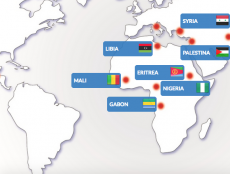
Articles
Op-Ed
Education Publishers Need to Re-Evaluate BIPOC Representation in Their Catalogs
By Ted Levine
February 24, 2021
Traditionally, a lot of that is covered throughout Black History Month has centered on the Civil Rights Movement, and for good reason. However, I think we as education publishers need to branch out from that to explore Black, Indigenous, and People of Color (BIPOC) representation in general. This needs to continue beyond the month of February. Of course it’s incredibly important to teach the heroes of the movement and recognize its tremendous influence in changing the direction of the country, but it’s also time to use that foundation to explore Black Americans’ impact on American history and culture in other ways, especially those figures who are underrepresented in the history books.
In the wake of the social unrest of last spring and summer, Kids Discover spent weeks reviewing and assessing our online library. I felt it was important to participate directly in these meetings, which is not always the case when we are planning or reviewing editorial. We discovered that approximately 15% of our platform’s Historical Figures category was composed of people of color. It was abundantly clear that we were under-representing this population. We also discovered just how light we were on arts and music history, both enormous parts of American culture.
The Kids Discover Library Found Just 15% of Its Historical Figures Category Included BIPOC Representation
With these findings, we took time to reflect on what we could do to share the stories and impact of Black history and culture and expand BIPOC representation. This was not just a moment to create new units and balance our online library. This was a moment to go deeper, and to do more to help rebalance the narrative around Black history and American history in this country.
In July, we released a five-part pledge, two tenets of which were to increase the number of stories we tell about Black figures in American history and to collaborate with organizations that share this commitment.

In the past, we have created free materials for Black History Month, but this year, guided by the pledge, we sought out a collaboration with Atlantic Records, because they have such a rich history of BIPOC representation and promoting music genres like soul, funk, and early rock and roll. Atlantic, along with their legacy roster Rhino Records, was really excited about the idea of creating units about pioneering artists Ray Charles, Aretha Franklin, and Curtis Mayfield.
Providing New Takes on Familiar Stories and Incorporating First-Hand Accounts Where Possible
We have always believed that one of the most powerful forces behind online learning and digital curriculum is creating multimedia learning experiences. For this project, we embedded more than a dozen tracks with Spotify and included album art and video, so students won’t just read about Ray, Aretha, and Curtis; they’ll connect with them through a multi-sensory learning experience.
We’re offering these units for free during Black History Month, with the goal to provide as many students and early learners as possible the opportunity to learn about and celebrate these three groundbreaking artists—and to get some feedback from teachers who have used these units. And so far, the feedback has been overwhelmingly positive. The three units have garnered a combined 50,000 pageviews just in their first three weeks.
Happy World Day of Social Justice! Kids Discover always will stand for #justice and #equality. This is a responsibility we take very seriously. Read our pledge mapping out our actionable plan to contribute to wider social justice: https://t.co/FEmrD7XudI#SocialJusticeDay pic.twitter.com/v4PNXM0eEc
— KIDS_DISCOVER (@KIDS_DISCOVER) February 20, 2021
While the entire team at Kids Discover is proud to partner with Atlantic and Rhino to celebrate these artists, our pledge calls for much more. In addition to creating new units focusing on Black individuals, we’ve found a way to help students adopt the lens of social justice throughout our library. We’ve launched what we call “reflection pieces.” They’re small modules scattered throughout our library, in units about the Constitution or Thomas Jefferson. They ask questions that are a little bit tougher than the traditional questioning we’ve had in our library. It creates a space for the students to pause, to reflect deeply about that subject, and try to look at different sides of the matter. We’re writing these for eight- to 14-year-olds, so the challenge for our authors is to make those questions something that can result in a good, productive class discussion at the elementary or middle-school level.
Another change we’re making is increasing the amount of first-person accounts. Let’s go back to our unit on Thomas Jefferson. As president and the main author of the Declaration of Independence, he was an important figure in American history—but was also an active slave owner. So we wrote a new topic about the Hemingses, the slave family that worked for Jefferson, and included quotes from some modern-day descendents of the Hemingses. As we re-examine our BIPOC representation, wherever we can, we’re using first-hand accounts, incorporating excerpts from speeches, so that it’s not just about us doing the writing. We’re doing everything we can to make history speak for itself.
An Ongoing Process
Like all education companies, though, we feel have a deep obligation to go beyond creating a product. We have to make sure our material gets to the kids who need it most. The final part of our pledge is to develop an annual scholarship program that grants free access to Kids Discover Online for individuals in socioeconomically challenged communities who would otherwise not be able to afford access. We’ve talked with a number of principals and districts throughout the country to develop criteria to qualify for the scholarships at the school level. As we did with the pledge, we’re taking our time with the scholarship, so that when we launch it, we can be fair and accommodating to the communities we’re serving.
We’re not trying to do everything all at once. Instead, we’re taking steps and looking back to the pledge on a regular basis, using it as a framework to guide future content development, maintain BIPOC representation, and keep us accountable. It’s something that I’d recommend to other education publishers. Have a clear set of principles that you can point to that will keep you accountable and will keep you moving in the direction of social and racial justice.
Ted Levine is the president and CEO of Kids Discover. He can be reached at [email protected].
Featured Image: “Aretha Franklin / Peri” by tgrauros is licensed under CC BY-SA 2.0









No Comments